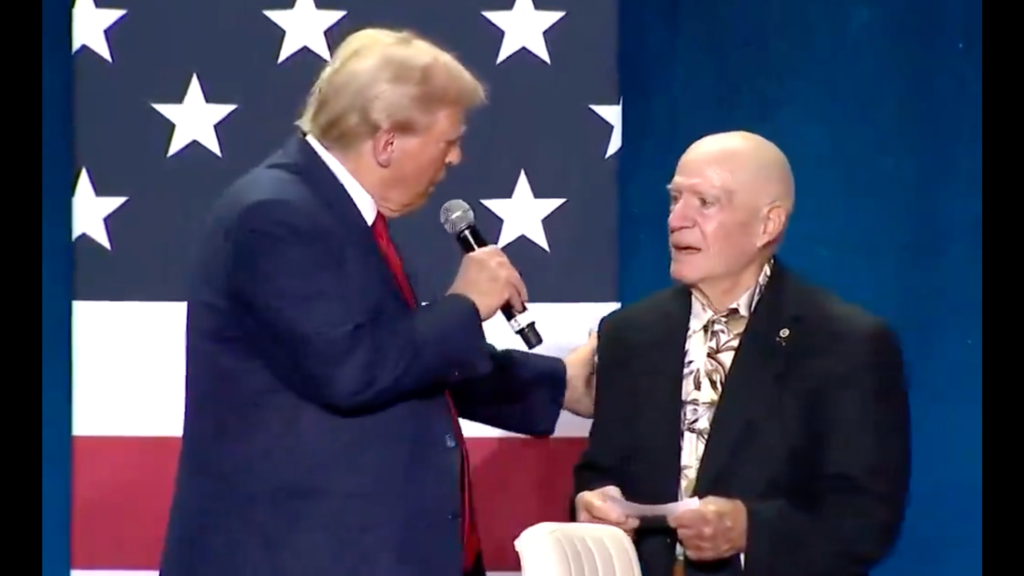During a recent town hall meeting in Fayetteville, North Carolina, Vietnam War veteran Dwight shared a poignant moment with President Donald Trump that centered around Dwight’s experiences and concerns for veterans today. After being inspired by Trump’s composure in the aftermath of a violent attempt on his life, Dwight reached out to the President with a heartfelt letter, which he also accompanied with the Purple Heart he earned during his service. In his letter, he expressed admiration for Trump’s strength and resilience, and described the emotional impact the incident had on both him and his wife, emphasizing their shared relief and gratitude. This act of kindness set the stage for a notable exchange between the two, highlighting the ongoing bond between veterans and leadership.
As Dwight took the stage alongside Trump, the conversation highlighted the feelings of joy and relief they both felt regarding the President’s survival from the assassination attempt. Trump offered a humorous reflection on his injuries, joking about how injuries to the ear can bleed profusely, showcasing his trademark style of turning serious topics into more accessible dialogue. Dwight’s gratitude extended beyond personal accolades as he recognized the unexpected gesture of receiving a letter and a challenge coin from the President, which he appreciated deeply. This interaction depicted a rare moment of connection between the President and a veteran whose experience mirrors the struggles faced by many who served in Vietnam.
Dwight’s reflections led to a broader discussion regarding the treatment of veterans in America, especially in light of increasing homelessness among this population. He noted a worrying trend in which the percentage of homeless veterans has doubled since the current administration took office, raising concerns about resources being allocated to undocumented immigrants while veterans are left to struggle. In a crassly emotive plea, he urged Trump to prioritize veterans over illegal immigrants, specifically calling for the removal of undocumented individuals from hotels where they are sheltered at the expense of American citizens. This pointed critique illustrated the frustrations many feel regarding how resources are managed between citizens and non-citizens.
In response, Trump voiced his strong sentiments regarding the issue of illegal immigration juxtaposed with the plight of homeless veterans. He passionately argued that millions of undocumented individuals are living in America and expressed outrage at the contrast between their care and the struggles of veterans. Trump’s remarks underscored the significant overlap he sees between his immigration policies and the need to protect and provide for American citizens, particularly disenfranchised veterans. This rhetoric highlighted a familiar theme in his administration’s narratives which posits security and resource allocation as fundamentally connected.
Trump’s assertions extended into a broader commentary on the state of America’s borders and immigration policies, where he vowed to take immediate action if he were to be in office again. He lamented the current handling of immigration, claiming the consequences were foreseeable and now playing out in societal challenges such as crime and safety. He framed the situation as a matter of common sense, advocating for stricter border control and policies to prevent serious crimes perpetrated by undocumented individuals. There was a palpable urgency in his message underscoring the need for action on these systemic issues, asserting that neglect would not be sustainable for America.
Finally, the meeting succinctly encapsulated the veteran community’s complex relationship with national leadership, especially during times when political sentiments oscillate. Both Dwight’s heartfelt letter and Trump’s fervent promises relay the urgency for policy reform that reflects the needs of veterans, who often feel overlooked. The interplay of gratitude, concern, and ambition woven into their discussions showcased a microcosm of broader national conversations on how best to serve those who have served the country. This event not only spotlighted Dwight’s personal story but also rekindled discussions on the administration’s obligations to veterans and the necessary balance between safeguarding national security and addressing the needs of American citizens. Through this dialogue, the message was clear: action and recognition for veterans are paramount, and their sacrifices should always be honored and prioritized within the broader framework of national policy.

